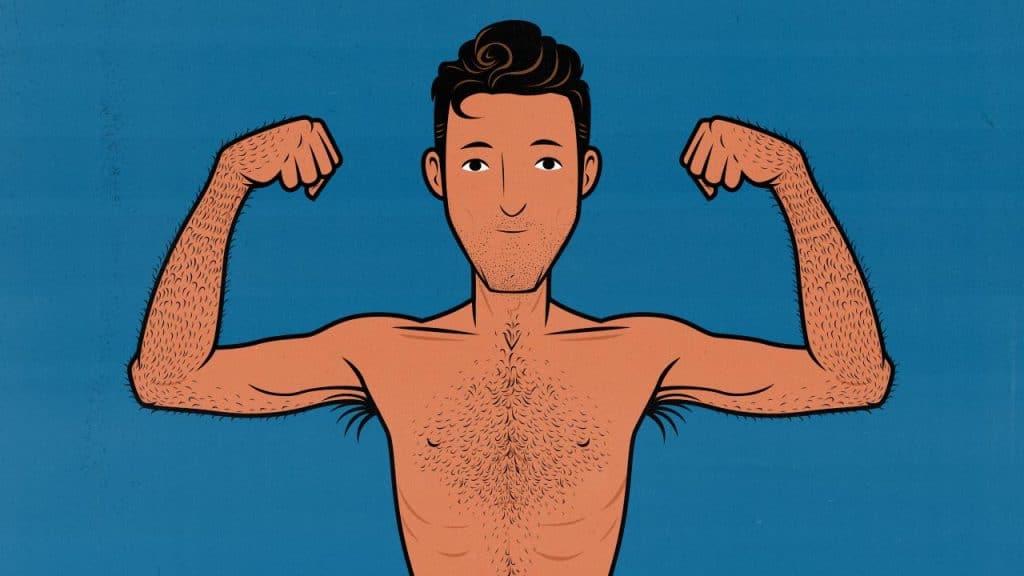
What’s an Ectomorph? Are Body Types Even Real?
An ectomorph is someone who is naturally slim. We tend to have thinner bone structures, fewer fat cells, and faster metabolisms. We’re often taller than average, with longer spines and limbs and proportionally smaller stomachs.
I’m an ectomorph. I’ve also spent the past fifteen years helping other ectomorphs gain weight, build muscle, and improve their health. It isn’t a body type. Some of our clients have included college, professional, and Olympic athletes. You can do great things with it.
Still, ectomorph is a controversial word. It was coined by the disgraced psychologist William Herbert Sheldon in the 1940s. He used it to describe the skinny body type and personality type, but he couldn’t prove a link between the two.
So, the word ectomorph isn’t scientific, but many of us still use it because it’s the simplest way to describe our thin builds.
- How to Know if You’re an Ectomorph
- Skinny Terminology
- The Origin of the Body Types
- Body Types Were Disproven
- The Revival of the Ectomorph
- Can Ectomorphs Get Big?
- How I Went From Skinny to Muscular
- Ectomorph Doesn’t Mean Skinny
- The Ectomorph Diet
- The Ectomorph Workout
- Should Ectomorphs Avoid Cardio?
- How to Bulk Up
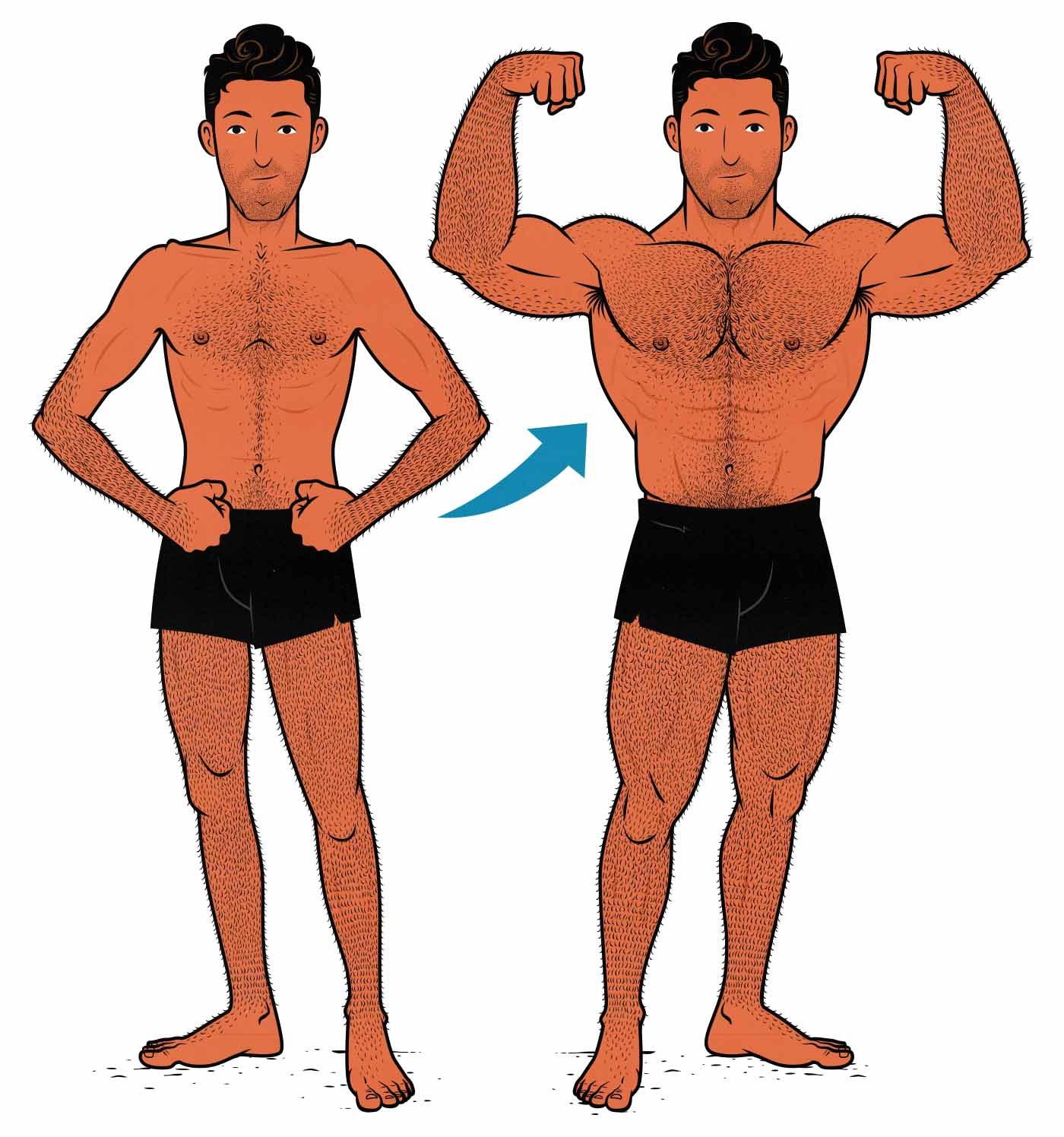
How to Know if You’re an Ectomorph
If you’re naturally thin, you can call yourself an ectomorph. You don’t need to run any special tests. That’s what most people mean when they use the word. However, you can also check your bone structure to see if it really is narrower than average.
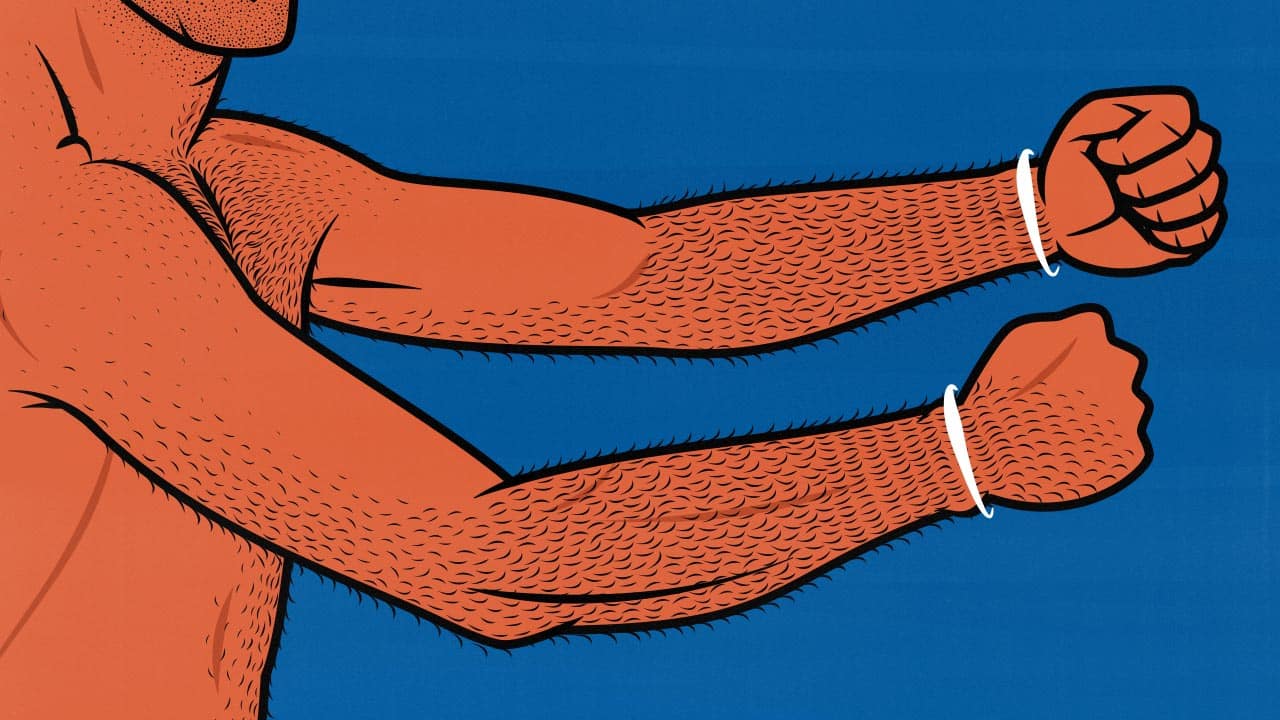
The easiest way is to measure your wrists and ankles, where there’s not much fat or muscle. The average man’s wrist circumference is a little over 7 inches. If yours is smaller, you might have ectomorphic traits.
You don’t need to factor in height. Taller people have longer, not necessarily thicker, bones. For example, I’m 6’2″ (taller than average), but my wrist circumference is 6.75″ (thinner than average). That’s totally normal for ectomorphs.
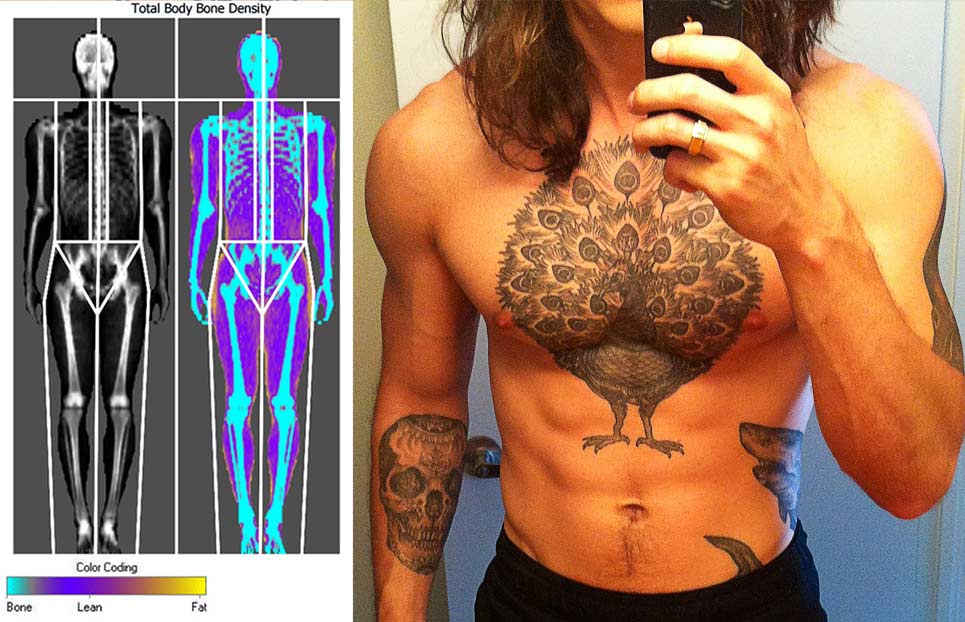
Another way is to get a DEXA scan. In the above photo, I’ve gained 70 pounds, going from 130 to 200 pounds. My bones became denser and heavier, but they didn’t get thicker. The DEXA scan still shows that I have unusually thin bones.
Skinny Terminology
There are a few terms describing the skinny body type. Each is related, but they all mean something slightly different.
- Ectomorph: someone with a thin bone structure. Most of us are naturally thin, but you could bulk up to become muscular or gain fat to become overweight.
- Skinny: someone with less muscle and fat than average, almost always because we have fewer fat cells, making it comfortable to be thin. It isn’t a body type. In fact, skinny people tend to build muscle faster than average.
- Skinny-fat: someone who has thin muscles but an unhealthy amount of body fat. It’s when you look thin in a T-shirt but overweight when you take it off. It’s another way of calling someone “out of shape.” It’s something you can change with diet and exercise.
- Hardgainer: someone who has difficulty eating enough calories to gain weight. This is the skinny guy who tries to bulk up but can’t budge the scale. This is usually because we have fewer fat cells and metabolisms that adapt easily to higher calorie intakes, burning away the calorie surplus.
- Non-responder: In the past, this is what researchers would call people who failed to build muscle during weight-training studies. However, that was usually because these people were hardgainers who didn’t eat enough food to gain weight.
- Low-responder: someone who has a lower-than-average response to the stimulus of lifting weights. It refers to someone with bad muscle-building genetics. There’s very little overlap between non-responders and skinny guys.
You could argue that “ectomorph” is a useful term because it describes something the other terms don’t. For example, I’ve gained 70 pounds, going from 130 to 200 pounds. I’m not skinny anymore, but I still have a thin bone structure, meaning I still have the same “body type.” I’m still an ectomorph.
The Origin of the Body Types
The term “ectomorph” was coined by William Herbert Sheldon in the 1940s. It was part of his somatotype taxonomy, used to divide men into three body types: mesomorphs, endomorphs, and ectomorphs.
- Mesomorphs were muscular and athletic.
- Endomorphs were squat and overweight.
- Ectomorphs were tall, narrow, and thin.
You aren’t supposed to fit neatly into one category. Most people have aspects of all three. This isn’t what Sheldon got in trouble for. There’s nothing inherently wrong here. Not yet.
The etymology of the word ectomorph is especially interesting. The prefix “ecto” refers to our endoderms—our skin. Ectomorph is a more sophisticated way of calling someone skinny.
Body Types Were Disproven
Naturally thin bodies do exist. I know because I live in one. But Sheldon’s goals were somewhat more nefarious than that. He wanted to link body types with personality types:
- Mesomorphs were bold and adventurous.
- Endomorphs were friendly and lazy.
- Ectomorphs were introverted, anxious, and intellectual.
I happen to be introverted and a little bit anxious, and I like the idea of being an intellectual. That description actually fits me fairly well. But it’s just a coincidence.
Sheldon was never able to prove a connection. Moreover, he was criticized for stereotyping people based on their appearance. The somatotypes were pseudoscience right from the very beginning. They still are.
The Revival of the Ectomorph
Words aren’t static. Once they’re released into our culture, their meaning changes and evolves. My favourite example of this is how the word “awful” originally meant “full of awe” or “worthy of fear and respect.” Now, it means “very bad.”
“Ectomorph” is no different. When it was ousted from the scientific community, the bodybuilding community caught hold of it. They dropped the personality stuff and used it to describe people who were naturally slim.
If someone calls you an ectomorph, chances are they’re using bodybuilding slang, not old psychological pseudoscience.
Can Ectomorphs Get Big?
Ectomorphs can get quite big. Most research shows that the amount of muscle you can build depends on how thick your bones are (study, study). I wrote a full article on that here, including a calculator that will tell you how big you can get.
That means a thinner-boned ectomorph can’t get as big as a thicker-boned mesomorph or endomorph. That’s why you won’t see many ectomorph bodybuilders or powerlifters. Our builds aren’t sturdy enough to support record-breaking amounts of muscle mass.
However, our natural muscular potential is still quite high. I was able to gain 70 pounds naturally, going from an underweight BMI of 16 to a healthy BMI of 25:
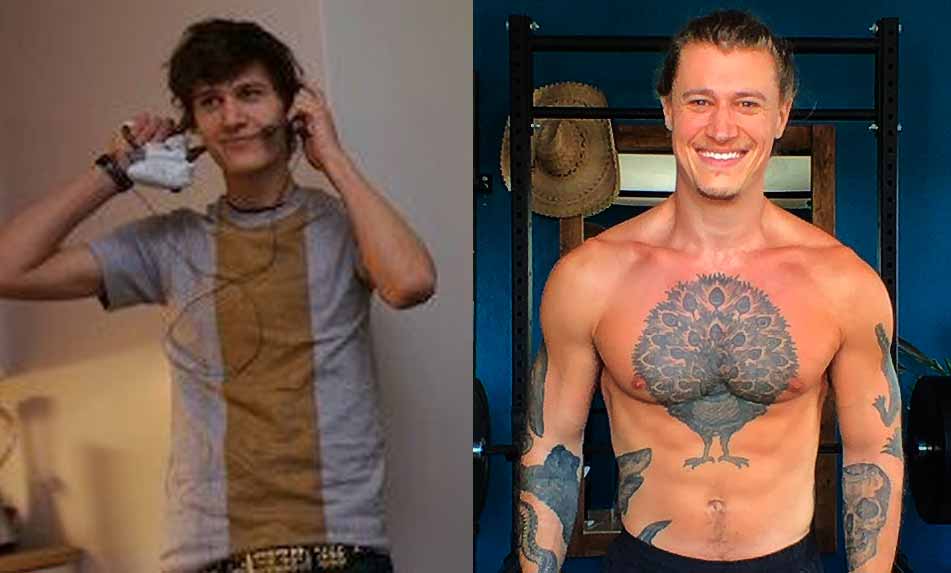
We can build strong and muscular physiques that rival most athletes. In fact, many Olympic athletes have more ectomorphic body types. A popular example is the Italian Olympic swimming team that went viral for having such attractive bodies:

We also tend to have an easier time getting lean and staying lean. We don’t have a tendency to overeat, and most of us also have fewer fat cells (explained here). So even though we can’t get as big, it’s often easier for us to get into good shape.
If you’re interested in aesthetics, there’s more good news. It seems that our ideal proportions are linked to the size of our bone structures. So, if you have thinner bones, then you’ll probably look best at a slightly lower body weight. I made a calculator for that here.
How I Went From Skinny to Muscular
I had a really hard time building muscle. None of the conventional fitness advice seemed to be written for me. I couldn’t gain weight no matter what I tried. Then, I learned about ectomorphs, and I found a community of people with the same struggles. Their advice worked for me.
As I was bulking up, I blogged about it. I called myself an ectomorph, but I wasn’t talking about how I was anxious or introverted. I was anxious and introverted, but I was just talking about being naturally thin.
This was fifteen years ago, back before the online fitness community had really taken off. Seeing a skinny guy blogging about gaining weight was rare. The blog took off, so I started spending my evenings helping my readers bulk up.
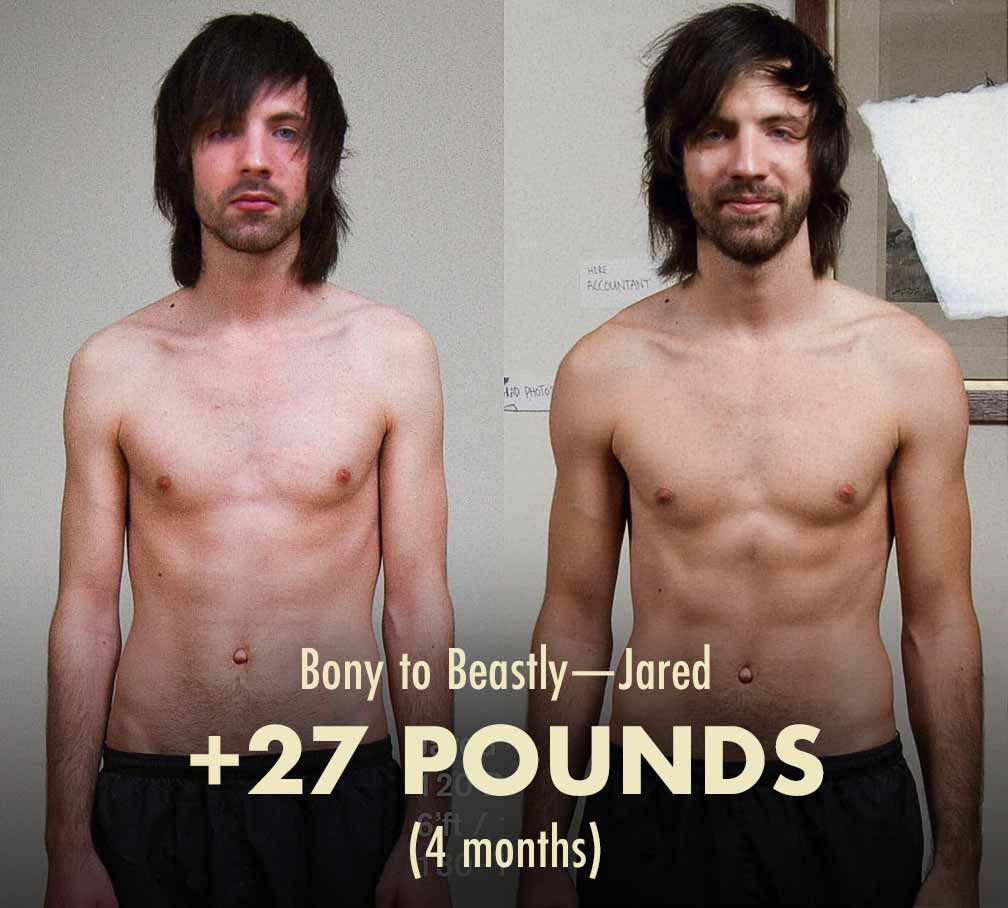
That was around the time I helped my skinny roommate bulk up. Jared was 6′ and 130 pounds—similar to my starting height and weight. He was running into a number of health issues, too. His posture was crumbling. His tendons were giving out.
As our blog continued to grow, we teamed up with a world-class strength coach, Marco Walker-Ng:

Marco had a degree in health sciences (BHSc), was a certified strength and nutrition coach, and had interned with Eric Cressey, the strength coach for the New York Yankees. When we got in touch with him, he was helping his university football team bulk up, coaching a few professional athletes, and training some of our Canadian Olympic rugby team.
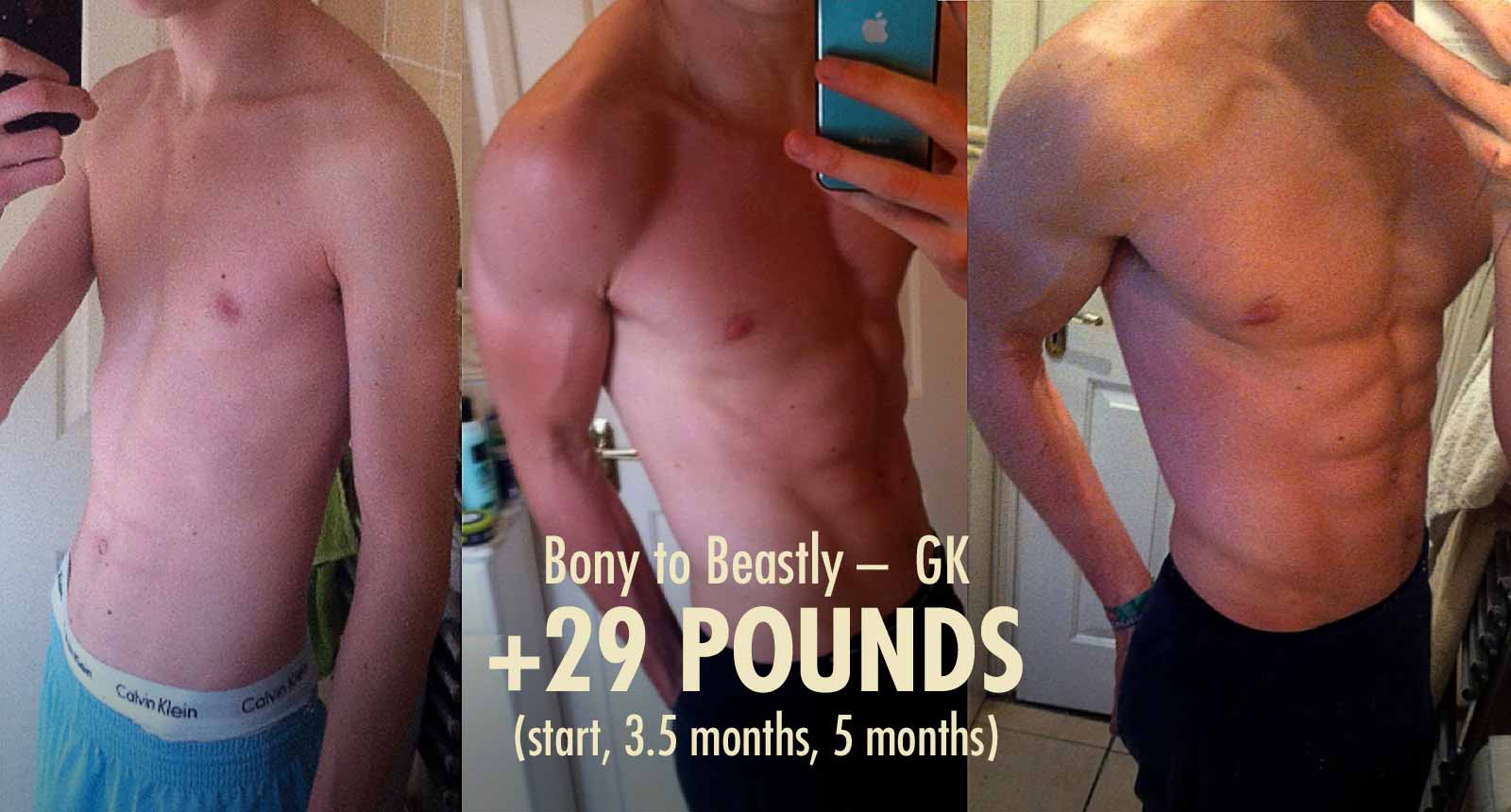
The three of us teamed up to create our Bony to Beastly and Bony to Bombshell programs, and we got to work helping skinny people bulk up, both through our blog and through our programs.

Then a funny thing started happening. People would come to our blog, see that we were calling ourselves ectomorphs, and accuse us of believing pseudoscience. If you want to avoid that, you could say you’re “naturally thin” instead of calling yourself an ectomorph. The terms are similar enough, and you won’t catch any flack for it.
Ectomorph Doesn’t Mean Skinny
Ectomorphs are often skinny, but not always, and we don’t have to stay that way. Having a narrow bone structure doesn’t prevent us from building muscle. In fact, we tend to build muscle quite quickly.
That’s where the term ectomorph comes in handy. Even after going from 130 to 200 pounds, even after filling out the sleeves of large t-shirts, I’m still an ectomorph. I still have trouble gaining weight, still lose weight when I get stressed, and still have thin bones.
The same is true in reverse. Some guys are naturally overweight “endomorphs” who succeed at losing weight. That doesn’t make them ectomorphs. They don’t have thinner bones, fewer fat cells, smaller appetites, or trouble gaining weight. They’re thin, yes, but they had to fight for it.
The Ectomorph Diet
Ectomorphs have different strengths and weaknesses from the average person. Having fewer fat cells makes it easier to bulk up leanly, control our appetites, resist cravings, and lose fat. That means some of the more popular diets don’t work very well for us.
For example, intermittent fasting restricts how often people eat, making it harder to eat as many calories. If you normally eat 700 calories for breakfast but skip it, you might only eat 500 extra calories at lunch, putting you 200 calories behind. That’s good for most people, but it doesn’t help us, especially since we often have small stomachs.
For another example, the ketogenic diet restricts carbohydrates. That cuts out some of the foods that are the easiest to overeat, such as croissants, frappuccinos, soda, ice cream, and donuts. However, it also cuts out nutritious foods that would help us bulk up, such as fruit smoothies, fruits, veggies, beans, lentils, whole grains, milk, and yogurt.
Low-fat diets aren’t popular right now, but you wouldn’t want to eat one of those, either. Fat is the most potent source of calories, and there are plenty of nutritious foods that are rich in fat. Think of eggs, nuts, seeds, olives, olive oil, avocados, avocado oil, peanut butter, almond butter, and dark chocolate.
So, the best ectomorph diet is one that helps you eat enough calories to maintain or gain weight. That usually means eating more often, eating lots of protein and plenty of carbs, and including healthy fat sources.
The Ectomorph Workout
Ectomorphs usually start with less muscle, usually because we have a history of eating less food. That can make it seem like we have poor muscle-building genetics, but we don’t. Our muscles grow easily when we lift weights and eat a proper bulking diet.
Hypertrophy Training is a style of training designed to stimulate muscle growth. It’s what bodybuilders do to build muscle. It’s also how powerlifters and athletes train when they’re trying to bulk up.
However, hypertrophy training is often confused with strength training, which is designed to make you stronger for your size. It’s how powerlifters teach their muscles to contract more forcefully for a single repetition instead of rationing their strength over many repetitions.
Strength training is great, but it works best when your muscles are already big. That’s why powerlifters go through “massing” phases, where they bulk up with hypertrophy training. If you’re still skinny, you should save it for a little later.
For example, I used hypertrophy training to build my bench press from 60 pounds to 225 pounds, lifting in a moderate rep range the whole time. When I could bench 225 for 15 repetitions, I knew my chest and shoulder muscles were big enough to bench 315 pounds, so I started strength training. After a few months, I benched 315—without building any extra muscle.
Should Ectomorphs Avoid Cardio?
Ectomorphs are often told to avoid cardio. The idea is that cardio burns calories, making it harder for us to gain weight and build muscle. That’s true. But cardio also makes us fitter, improves our digestion, and doesn’t interfere with muscle growth. There’s no need to fear it.
Everyone benefits from having a strong heart, a robust vascular system, and powerful lungs. Even ectomorphs.
However, if you’ve just started lifting weights, you don’t need to start doing cardio right away. It’s usually better to ease into exercise gradually. You can spend the next few months bulking up, which should be enough stimulation to improve your cardiorespiratory health. Then, when you finish bulking, you can ease back on the hypertrophy training and ramp up your cardio.
If you’re out of shape or new to cardio, you can start by going on brisk walks. For example, you could go on a 20–30 minute walk every morning.
How to Bulk Up
Alright, that’s it for now. If you want more muscle-building information, we have a free bulking newsletter for naturally skinny guys.

If you want a full foundational bulking program, including a 5-month full-body workout routine, diet guide, recipe book, and online coaching, check out our Bony to Beastly Bulking Program. Or, if you want a customizable intermediate bulking program, check out our Outlift Program.

